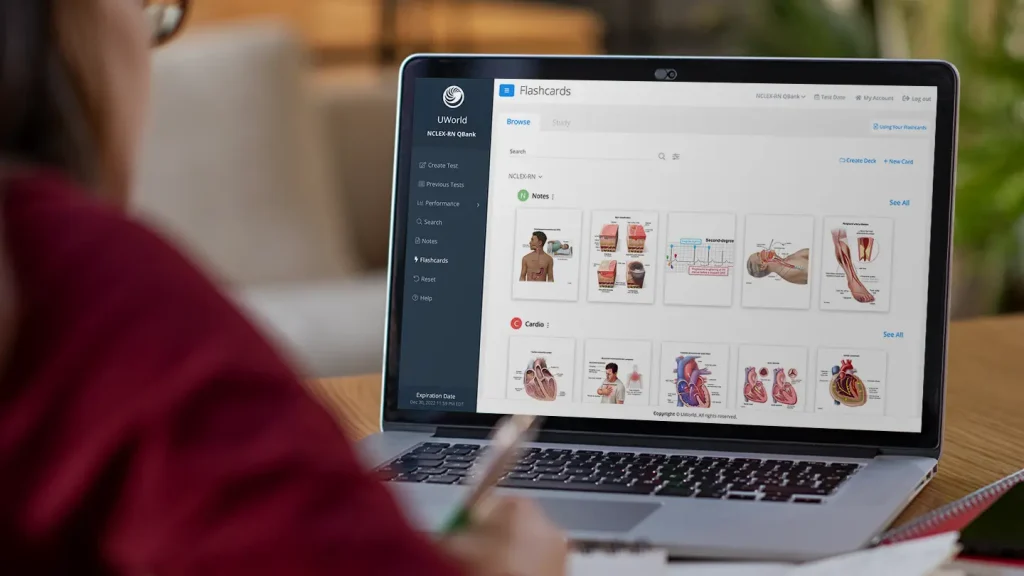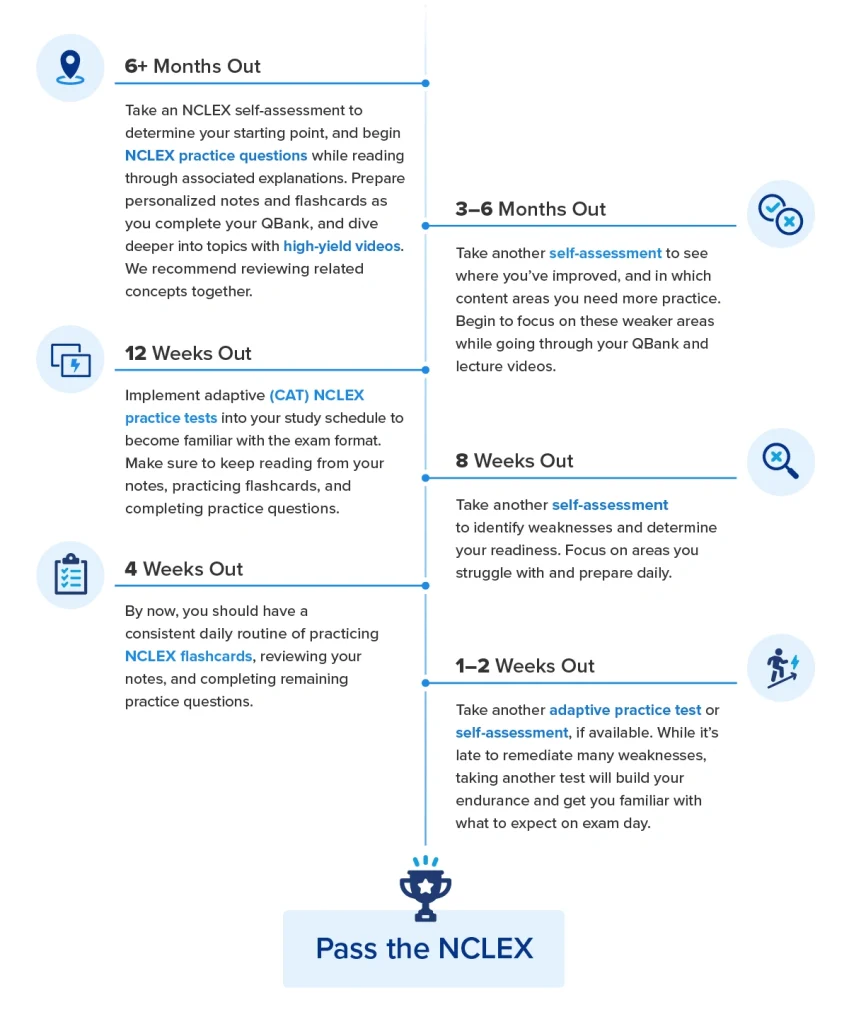NCLEX® Study Plan
Making a detailed NCLEX study plan will reduce stress, keep you on track, and greatly improve your chances of passing on your first attempt. To help you get started, our nursing experts compiled their go-to NCLEX study tips for success, including downloadable NCLEX study tips to align your efforts with exam requirements.

What to Study for the NCLEX
Before we get too far ahead of ourselves, it’s worth exploring what exactly you’ll need to know for your exam.
To point you in the right direction, the NCSBN has compiled an NCLEX-RN Test Plan and NCLEX-PN Test Plan that outline the distribution of content for each exam. The main categories are client needs, integrated processes, and clinical judgment.
There are also a few specific NCLEX question types that we suggest you spend extra time reviewing. Dosage calculations have always given students problems, while the Next Gen NCLEX has introduced bow-tie questions and “unfolding” NGN case studies:
Learn how to answer nursing dosage calculations quickly and accurately with easy-to-follow tips, formulas, and examples.
Master challenging bow-tie questions with six helpful tips on successfully answering these complex questions.
Tackle NGN case studies with our expert advice on the structure, scoring, and approach.
How to Study for the NCLEX
Now that you know what to study, let’s take a look at how. Our data shows that completing exam-style practice questions is the most effective way to prepare for the NCLEX. For example, students who achieve an average UWorld NCLEX QBank score and “High” self-assessment score pass 98% of the time. As the saying goes, practice makes perfect, and the NCLEX is no exception. Other keys to success you should look for in an effective NCLEX review course include:
- A testing environment that mirrors the real NCLEX
- Detailed rationales that explain right and wrong answer options
- Supplemental lecture videos to reinforce highly tested concepts
- Active-learning tools like flashcards and digital notes
- CAT exams and self-assessments for additional practice and to determine your readiness
Sample NCLEX Study Schedules
Our nursing educators recommend developing your NCLEX study plan as far before your projected exam date as possible. This will give you time to dive deeper into the material, tackle difficult concepts in bite-sized chunks, study with other students, remediate weaknesses, and adjust as needed.
6-month NCLEX study plan example
Whether you plan to take the NCLEX-RN or NCLEX-PN, the pace and focus of your studies will largely depend on how many days out you are from your exam and how long you can prepare each day. As such, our sample NCLEX study plan can be used as a rough guideline:
As you refine this outline into a daily NCLEX study plan, be specific about how many hours you will dedicate to practice questions, flashcards, note-taking, and content review.
Ten Tips for NCLEX Success
Preparing for the NCLEX can be an incredibly exciting, yet nerve-racking process. It’s your last hurdle to become a licensed nurse, but where to start?
1-month NCLEX study plan example
If you wait to begin your review, there are still effective ways to maximize your odds of passing the NCLEX. Let’s assume you only have one month before your exam date and are just starting your dedicated preparation. You’ll want to retain as much material as possible while avoiding burnout, so it’s even more important that you be specific and strategic with your study plan. Here’s an example of how you can target a single NCLEX subject, such as Child Health, in a limited period of time:
| Sunday |
Create a flashcard deck for Child Health Create a My Notebook section for Child Health Complete 25 Child Health practice questions (create flashcards and notes as you practice) |
|---|---|
| Monday |
Watch lecture videos on Child Health topics Add notes to your notebook to deepen your understanding Complete a 10-question practice test with “unused” Child Health questions |
| Tuesday |
Complete a 25-question practice test with “unused” Child Health questions Create flashcards and notes as you practice |
| Wednesday |
Review your Child Health flashcard deck and notebook entries (make edits as needed to clarify ideas) Practice your flashcards in “Study Mode” to leverage spaced-repetition technology Complete a 10-question practice test with “unused” Child Health questions |
| Thursday |
Scheduled break, yay! |
| Friday |
Complete a practice test with “marked” and “omitted” Child Health questions Spend extra time reviewing these answer explanations, summarizing content in your notes, and watching related videos as needed |
| Saturday |
Complete a practice test with “incorrect” Child Health questions Spend extra time reviewing these answer explanations, summarizing content in your notes, and watching related videos as needed |
With this type of short-term NCLEX study plan, make sure you pay attention to the number of topics you need to cover. If you’re strong in Child Health, maybe you can get away with spending only four days reviewing it before moving on to Adult Health. Once you get into the final week before your exam, plan some time to go over your flashcards and notes from past topics, and take a self-assessment to get into a testing mindset.
NCLEX Advice from Nurses Who’ve Passed


Conquer NCLEX without burnout! Nurse Maya shares her advice for managing test stress through self-care & mindset mastery.


Study smarter, not harder! Nurse Holly shares advice on building an NCLEX study plan that includes goals & rewards to keep you motivated.
Frequently Asked Questions
Read More About the NCLEX
Learn the structure and format of the NCLEX-RN and NCLEX-PN exams, including their length, how many questions there are, and other important information.
NCLEX Eligibility, Registration, and Cost
View our guide on NCLEX registration. We’ll walk you through when you’re eligible, how to sign up, applicable fees, and specific policies you’ll need to know.
The NCLEX is a computerized adaptive test (CAT). Dive into what this means, and how new partial-credit scoring will impact your exam results.
Explore essential resources within the comprehensive NCLEX-RN Test Plan. Uncover content areas, subcategories, and summaries to gain essential insights.
Uncover essential insights within the comprehensive NCLEX-PN Test Plan. Explore content domains, subtopics, and summaries to guide your preparation effectively.
Review how the NCLEX has changed to better examine your clinical judgment. The updated NGN includes new question types and scoring to be aware of.

